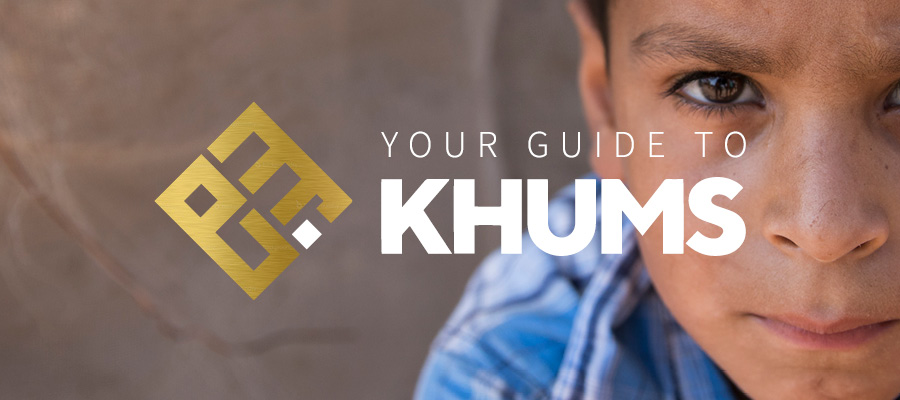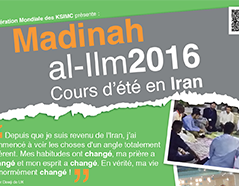Retrouvez-nous ce mois pour un programme spécial en compagnie de Cheikh Mohammed al Hilli afin de développer notre réflexion sur la façon dont nous pouvons réaffirmer notre engagement envers l’Imam Houssayn (as).

What is khums?
‘Khums’ literally means ‘one-fifth’. In Islamic law, it refers to an obligatory (wajib) religious tax which one must pay on several things, the most common of which is surplus income from earnings and gains. The amount of khums one must pay on surplus income is 20%.
What happens to the khums payments?
Khums payments are divided into two equal parts:
One half is given to the Imam (a) of the time; this is called ‘Sahm-e Imam’ (the portion for the Imam (a)). In the absence of the Imam (a), this part must either be given to a Marja-e Taqlid (i.e. a high religious authority who can be followed in matters of Islamic law), or to an individual or organisation that has been given permission (ijaza) to collect khums on behalf of the Marja. This portion is then used for worthwhile purposes authorised by the Marja.
The other half is given to sayyids (descendants of the great grandfather of the Prophet (s)) who are poor, orphans, or stranded travellers. This is called ‘Sahm-e Sadat’ (the portion for sayyids).
Why do we pay khums?
Khums is one of the pillars of Islam. It has been prescribed by Allah (in Surat al-Anfal, verse 41), and it was practised during the life of the Prophet (s) and the Imams (a).
As such, khums is an act of worship and must be given with the right intention, i.e. for attaining proximity to Allah (qurbatan ilallah).
If khums is paid correctly, then the earnings of the person are purified and lawful (halal). On the other hand, if khums is neglected, the earnings of the person will be regarded as ‘spiritually impure’ and can invite divine retribution in this world and the next.
Without khums, many important projects and many poor Muslims around the world would not receive the help they critically need.
On what things is khums payable?
Khums is payable on seven things, but for the majority of us today, the one that applies the most – and which is the focus of this guide – is ‘surplus income from earnings and gains’. Earnings and gains include:
- Salaries and wages
- Earnings from businesses
- Earnings from investments
- Gifts
- Welfare and sadaqah (alms given to the poor)
- Prizes and bonuses
- Unexpected legacy (something bequeathed to you in a will of someone not related to you)
But there are exceptions. Khums is not payable on the following types of receipts:
- Mahr (the dowry given by a husband to his wife)
- Inheritance, unless the heir is certain that the deceased was committed to paying khums but just did not pay it from the estate before his death.
- Diyah (blood money, i.e. compensatory payments defined by the Sharia for personal injury)
- Financial loan (this will be explained in more detail later)
When do I pay khums?
By Allah’s grace on His creation, khums is not payable immediately. Rather, you have a choice of either paying khums when you receive an income, or postponing it until the end of the khums year having deducted all allowable expenses for that year from your income; you would then pay khums on the remaining amount, i.e. on your surplus income.
The date of your khums payments can be based on either the Islamic calendar or the Gregorian one.
Deciding on the year-end will depend on your personal circumstance. If you are not working to earn a living – for example, you are retired, a housewife, a student, or unemployed – then you may take every income and gain to have its own period for a year. For example, if you receive a gift of £100 today, then whatever remains of that £100 in a year’s time from now, khums will be payable on it.
If you are earning a living by means of a single job, then a single year-end date must be specified for all incomes; that date will be the day you started work.
However, khums will be payable immediately if there is an income which you know you will not use until the end of the year, as an obligatory precaution.
Which expenses are deductible from my income?
The expenses that are deductible and allowable are any expenses that are incurred by you and your dependents during the khums year, as long as they are conventionally reasonable for a person of your social standing to incur and are not forbidden in Islamic law.
Deductible expenses include:
- Food and drink
- Clothing
- Residence and accommodation (rent and mortgage payments)
- Furniture
- Household items and appliances
- Marriage costs
- Car and transport
- Holidays and vacations
- Hajj and ziyarah
- Charity (obligatory and voluntary)
- Gifts given
- Provision for guests
- Medical expenses
- Financial liabilities under the Sharia, such as recompense (kaffarah), compensative payments for missing a fast in Ramadan (fidyah), and avowed liabilities (nadhr)
- Insurance
- Repayment of loans
- Books and apps
- Education
- Utility, internet, and telephone bills
- Maintenance and repairs
- Mandatory pension deductions
- Government taxes and penalties
- Toys for children
- Decorative items for the home
- Payment of wages
- Membership dues
- Business expenditure including wages, rent, insurance, and taxes
- Depreciation in a commodity or loss of a commodity
Note: Procurements for future years are not deductible expenses. Therefore, khums is payable on all items that are obtained but remain unused until the end of the khums year. However, if you require an item in advance because it will not be available when you need it, or it will be excessively difficult for you to obtain it in the following year, then it will be considered a deductible expense.
Is khums payable on savings I have made for the future?
Yes, khums is payable on all savings. Once khums has been paid on a sum, that sum will no longer be liable for khums for as long as it remains.
There are some long-term savings which are for a specific use in the future, such as savings for a child’s marriage. Khums is liable on such savings as they are not used in that year.
However, if it is appropriate for a father with his social status – according to the conventional norm in his society – to save for such a purpose, and he would be deemed negligent and careless about his family and their future if he did not do so, then that particular saving will not be liable for khums.
The same applies to other long-term savings for expenses in the future, such as saving for a first residential home, provided the condition mentioned above is fulfilled.
Is khums obligatory on a person with debts?
Some people might think, “As long as I have debts, I don’t need to pay khums.”
This is a misconception. If a person is indebted with loans, it does not affect his obligation to pay khums on his new surplus income every year. If he makes repayments towards those loans, then those payments are deductible expenses.
But, there are two exceptions to this; an unpaid loan can be deducted from one’s surplus income if:
- The loan is taken to cover expenses for running a business, as long as a) there are no assets or cash available to cover those expenses instead of having to take a loan; and b) the expenses in question are reasonable for the type of business in question.
- The loan is for a deductible expense of that year. This is where there has been a change in His Eminence al-Sayyid al-Sistani’s ruling.
Regarding the first exception, if those two conditions are fulfilled, then a loan to cover the following expenses would be deductible:
- Renting of premises to be used as an office, shop, storage etc.
- Staff salaries
- Taxes
- Utility bills
- Insurance
- Hiring or purchasing tools and equipment
- Marketing and advertising costs
- Vehicle payments
- Maintenance of premises and equipment
Note: A loan for the purchase of stock to be sold would not be deductible.
Now we come to the second exception, which will be the focus of the remainder of this guide.
Change in ruling on loans
Previous ruling
Based on His Eminence’s previous ruling, if a loan is taken to pay for something that is a deductible expense for that year, then the amount of that loan would be deductible from the surplus income of that year.
For example, if a person takes a loan of £5,000 to buy a car, then there are two scenarios:
- He has a surplus income at the end of the year of an amount equal to or more than the amount of the loan, such as £8,000. In this case, he can deduct £5,000 from the surplus income, and khums is only liable on the remaining £3,000.
- He has a surplus income at the end of the year of less than the amount of the loan, such as £1,000. Here, no khums is payable that year, but the remaining amount (£4,000) cannot be deducted from the net income of the following year.
New ruling
His Eminence al-Sayyid al-Sistani now allows the remaining outstanding balance of a loan to be deducted from the surplus income of future years until the time the person’s cumulative surplus income reaches the amount of the outstanding loan balance.
Based on His Eminence’s new ruling, the second scenario above would look different. The person would be able to deduct the remaining amount (£4,000) from the net income of the following year and every subsequent year as long as his cumulative surplus income did not reach the amount of the outstanding loan balance.
For example, if a person takes a loan of £20,000, and his surplus income each year is £5,000, he would not be liable to pay khums for four years.
Note: His Eminence allows his Muqallids (i.e. those who follow him in matters of Islamic law) to continue applying the old ruling if they so wish.
What kind of loans does the new ruling apply to?
The loan must be for an expense that is deductible and allowable under the laws of khums, as mentioned previously (under the heading ‘What kind of expenses are deductible from my income?’).
The new ruling applies to all such loans, whether it is a small loan or a large one; and whether the loan is to be repaid in full by a particular date or in monthly or yearly instalments.
How does the new ruling apply to mortgages?
The new ruling can affect many people who have mortgages on their homes.
So, if a person has bought a house for his residence with a loan secured on the house – i.e. a mortgage – then he can deduct the amount of the outstanding loan at the end of each khums year from that year’s surplus income until the cumulative surplus income reaches the amount of the outstanding loan balance. During those years, he will not pay any khums. Thereafter, the mortgage repayments on the capital loan amount, not including the interest, will not be deductible (as they were with the old ruling). As for the interest, it will be considered a deductible expense; this applies to interest-only mortgage payments, and to the interest portion of repayment mortgages.
The yearly process of deducting the loan from the cumulative surplus income will continue for as long as the house remains in one’s residential use. If it is not used as one’s residence in a sufficient manner for a year, then this process will end.
The new ruling allows a person to have khums-free surplus income for at least some years. However, in the long term the total amount that will be khums-free vis-à-vis the loan will be the amount of the loan, whether the new ruling is used or the old one.
For example, if a person takes out a 25-year mortgage of £250,000 to buy a house for his residence, then:
- If the new ruling is applied, the surplus income that is khums-free and those mortgage repayments which are deductible will eventually add up to £250,000.
- If the new ruling is not applied, the mortgage repayments will be deductible and will eventually add up to £250,000.
Example 1
If a person takes out a 25-year mortgage of £250,000 to buy a house for his residence that costs £300,000, then the deposit/down-payment of £50,000 will be a deductible expense.
His yearly repayments towards the capital loan amount will be £10,000.
Any interest amounts paid above this will be deductible expenses.
|
Year |
Mortgage repayments |
Outstanding loan |
Surplus income |
Cumulative surplus income |
Amount subject to khums |
Khums payable |
|
1 |
10,000 |
240,000 |
5,000 |
5,000 |
0 |
0 |
|
2 |
10,000 |
230,000 |
2,000 |
7,000 |
0 |
0 |
|
3 |
10,000 |
220,000 |
9,000 |
16,000 |
0 |
0 |
|
4 |
10,000 |
210,000 |
0* |
16,000 |
0 |
0 |
|
5 |
10,000 |
200,000 |
3,000 |
19,000 |
0 |
0 |
|
6 |
10,000 |
190,000 |
4,000 |
23,000 |
0 |
0 |
|
7 |
10,000 |
180,000 |
6,000 |
29,000 |
0 |
0 |
|
8 |
10,000 |
170,000 |
6,000 |
35,000 |
0 |
0 |
|
9 |
10,000 |
160,000 |
9,000 |
44,000 |
0 |
0 |
|
10 |
10,000 |
150,000 |
5,000 |
49,000 |
0 |
0 |
|
11 |
10,000 |
140,000 |
3,000 |
52,000 |
0 |
0 |
|
12 |
10,000 |
130,000 |
1,000 |
53,000 |
0 |
0 |
|
13 |
10,000 |
120,000 |
4,000 |
57,000 |
0 |
0 |
|
14 |
10,000 |
110,000 |
6,000 |
63,000 |
0 |
0 |
|
15 |
10,000 |
100,000 |
0* |
63,000 |
0 |
0 |
|
16 |
10,000 |
90,000 |
2,000 |
65,000 |
0 |
0 |
|
17 |
10,000 |
80,000 |
3,000 |
68,000 |
0 |
0 |
|
18 |
10,000 |
70,000 |
5,000 |
73,000 |
3,000** |
600 |
|
19 |
10,000 |
60,000 |
5,000 |
|
15,000*** |
3,000 |
|
20 |
10,000 |
50,000 |
3,000 |
|
13,000 |
2,600 |
|
21 |
10,000 |
40,000 |
6,000 |
|
16,000 |
3,200 |
|
22 |
10,000 |
30,000 |
1,000 |
|
11,000 |
2,200 |
|
23 |
10,000 |
20,000 |
11,000 |
|
21,000 |
4,200 |
|
24 |
10,000 |
10,000 |
5,000 |
|
15,000 |
3,000 |
|
25 |
10,000 |
0 |
4,000 |
|
14,000 |
2,800 |
* If there has been zero surplus income, or if there was a loss that year, the figure will be zero.
** This year, khums will be payable on the amount that is above the outstanding loan balance.
*** From this year onwards, khums will be payable on the surplus income plus the amount of mortgage repayment that year.
In this example, we can see that the total amount of £70,000 has been deducted from the surplus income (years 1-18), and the mortgage payments for those years totalling £180,000 has also been a deductible expense, giving a total of £250,000 relief against the loan of £250,000.
Example 2
If a person takes a 20-year mortgage of £100,000 to buy a house for his residence, his yearly repayments towards the capital loan amount will be £5,000.
|
Year |
Mortgage repayments |
Outstanding loan |
Surplus income |
Cumulative surplus income |
Amount subject to khums |
Khums payable |
|
1 |
5,000 |
95,000 |
1,000 |
1,000 |
0 |
0 |
|
2 |
5,000 |
90,000 |
2,000 |
3,000 |
0 |
0 |
|
3 |
5,000 |
85,000 |
1,000 |
4,000 |
0 |
0 |
|
4 |
5,000 |
80,000 |
0* |
4,000 |
0 |
0 |
|
5 |
5,000 |
75,000 |
3,000 |
7,000 |
0 |
0 |
|
6 |
5,000 |
70,000 |
1,000 |
8,000 |
0 |
0 |
|
7 |
5,000 |
65,000 |
2,000 |
10,000 |
0 |
0 |
|
8 |
5,000 |
60,000 |
0* |
10,000 |
0 |
0 |
|
9 |
5,000 |
55,000 |
0* |
10,000 |
0 |
0 |
|
10 |
5,000 |
50,000 |
3,000 |
13,000 |
0 |
0 |
|
11 |
5,000 |
45,000 |
1,000 |
14,000 |
0 |
0 |
|
12 |
5,000 |
40,000 |
1,000 |
15,000 |
0 |
0 |
|
13 |
5,000 |
35,000 |
2,000 |
17,000 |
0 |
0 |
|
14 |
5,000 |
30,000 |
1,000 |
18,000 |
0 |
0 |
|
15 |
5,000 |
25,000 |
1,000 |
19,000 |
0 |
0 |
|
16 |
5,000 |
20,000 |
0* |
19,000 |
0 |
0 |
|
17 |
5,000 |
15,000 |
0* |
19,000 |
4,000** |
800 |
|
18 |
5,000 |
10,000 |
1,000 |
|
6,000 |
1,200 |
|
19 |
5,000 |
5,000 |
3,000 |
|
8,000 |
1,600 |
|
20 |
5,000 |
0 |
2,000 |
|
7,000 |
1,400 |
* If there has been zero surplus income, or if there was a loss that year, the figure will be zero.
** As there was no surplus income this year, and the cumulative surplus income was more than the outstanding loan balance, £4,000 of the mortgage repayments will be subject to khums.
In this example, we can see that the total amount of £19,000 has been deducted from the surplus income (years 1-17), and the mortgage repayments for those years totalling £81,000 has also been a deductible expense, giving a total of £100,000 relief against the loan of £100,000.
Pay Your Khums
The World Federation is proud to have permission (ijaza) from His Eminence al-Sayyid Ali al-Sistani (may Good protect him) to collect khums payments on his behalf.
You can make your full khums payment, or either of the Sehm payments, online by visiting our donate portal and searching “khums”.
Don’t delay – fulfil your duty and pay today.
Related News
It's been one year since the opening of our office in Najaf. Click here to read the first year highlights of this office.
A powerful moment of sharing and brotherhood - A wonderful interfaith meeting held in Mehfile Zainab (Paris North Jamaat) in France on Saturday 6th April 2019.












